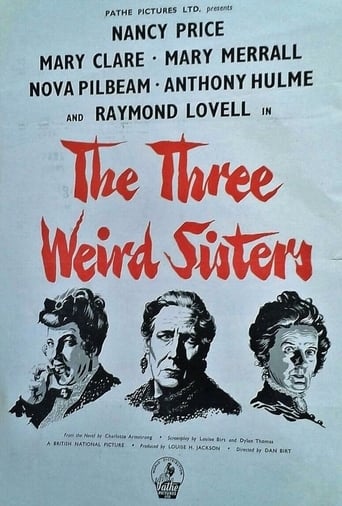malcolmgsw
I counted in all no less than 6 separate attempts to kill Nova Pilbeam and Raymond Lovell.This rather resembles a Welsh Adams family or the downside of Arsenic and Old Lace.Towards the end it just becomes too laughable to take seriously.Nova Pilbeam fainting away at the sight of the three stern faced sisters.Then the sisters hauling about the furniture and breaking down walls so that they could fix Nova one last time.I have only seen this film once before,many years ago at the BFI Southbank and the ending has stayed with me ever since.So I think that you could say that it is fairly memorable.This was one of a number of rather exotic films that came out after the end of the war.All that repressed emotion no doubt.
writers_reign
!948 might have been a tad too late for this Poe-faced Gothic outing just as the poetry masquerading as dialogue and penned by Dylan Thomas was a tad out of keeping with realistic speech. Thomas tips his symbolic glove in an early scene when a collapsing mine triggers falling plaster and cracks in the walls of the 'big house' in the mining village, which is home to the eponymous sisters, who pledge to rebuild the homes in the mining village destroyed by the collapse. They make this pledge despite not having change of a match but (so they think) secure in the knowledge that their half brother (Raymond Lovell), who long ago left the village and became a successful businessman, will underwrite the repairs. Lovell decides to mark their card and journeys to Wales with his secretary, Nova Pilbeam, and anticipates Ann Robinson by a good 50 years with the question, 'is this hell, or Wales'. Once ensconced in the house he begins to resemble Bob Hope in The Cat And The Canary with the three sisters blending into Gale Sondergaard. I can't think of a single reason why you would want to watch this but then what do I know.
dbborroughs
When a mine collapses destroying the homes built on top of it, the three sisters of the the family that owned the mine promise to rebuild the homes. This doesn't sit well with their brother who now lives in the city and is the real source of money for the family. Returning home in order to straighten out the situation, he soon finds that all is not well in the old homestead, and his life is in grave danger.A post war-Gothic tale with a great deal on its mind this is a movie that never really works. Graced with a script that was written in part by Dylan Thomas the dialog is often very literate in a way that real people never talk. The writing does provide for some very wicked exchanges between the characters but it never really comes to life. Some of the miners are just a bit too poetic about the tragedy that has befallen their small town.Thematically the film is about the clash of the old and the stayed with the new and the modern. I mention this because the film seems much more interested in ideas than it is in any real action. We have the three sisters who never left home and want to rebuild things the way they were battling their brother and his secretary who have come from the outside and want live in the present and deal with the situation as it is. Its a battle that forms the basis, in one way or another, for almost every scene often to the detriment of the drama. Everything seems to be arranged to have some deep meaning from the aliments of the sisters to the crumbling nature of the manor house. I wasn't watching a movie so much as a dramatized argument for the modern; there aren't people on the screen rather they are ideas.I applaud the filmmakers for wanting to make a movie that is more than a Gothic drama, but they went the wrong way and forgot the drama. Honestly this is a tough movie to get through, its 80 minutes long and feels like twice that in the lecture hall. As good as the basic plot line is the execution makes this a film I doubt I'll ever watch again.Worth a shot if you don't mind seeing a literate drama that tries too hard and just misses being something special
noir guy
Co-scripted by Dylan Thomas, this tale of three ageing and infirm, although philanthropically inclined, spinster sisters presiding over a crumbling mansion in 1930s South Wales is an oddball post-War slice of Welsh Gothic. In their hermetically sealed universe, the sisters' otherworldly formalism is threatened, firstly, by a landslip caused by the family mine which destroys part of their small village at the outset and, secondly, by the return of their wealthy and apparently hard-hearted pragmatist brother and his primly efficient secretary, whose modernity further unravels the web of antiquity which has preserved their world. The narrative clunkiness is swiftly apparent from the somewhat obvious symbolism of the structural cracks and fissures which fracture the sisters' home at the beginning of the movie, and the stateliness of the family's surroundings is matched by similarly ossified pacing; Dylan Thomas' occasionally poetically barbed and witty insights notwithstanding. It's not just the old dark house that creaks here; even a nick of time climax does little to shore up the cracks of this crumbling edifice.


